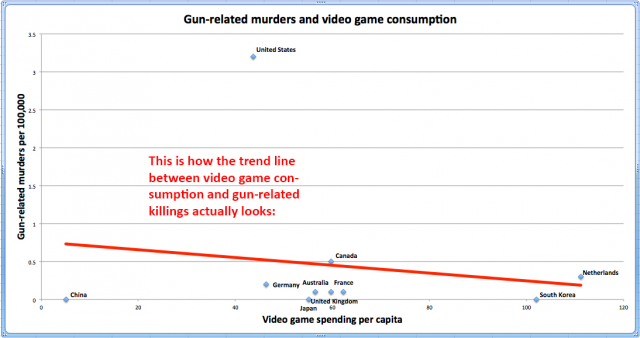
As the world continues to react to last Friday's horrific school shooting in Connecticut, many people are grasping for potential social explanations for mass shootings. As usual, violent video games are being offered as a scapegoat in some corners, with everyone from Fox News pundits and bottom-feeding attorney Jack Thompson to the NRA and Obama campaign adviser David Axelrod suggesting that the popularity of virtual violence may lead to more real-world violence in some way.
Unfortunately for these talking heads, the data just doesn't seem to support their assertion. Max Fisher at The Washington Post helpfully compiled a graph mapping the per-capita spending on video games in the top ten national markets on one axis and the per-capita gun-related murders in those countries on the other. Far from showing a strong link between the two statistics, the graph actually shows a small negative correlation—as video game spending goes up, gun-related murders tend to go down.
While it's true that the United States is the biggest single market for video games in the world and also accounts for more gun-related murders than most other industrialized countries, some of that has to do with the sheer size of its population. When accounting for number of people, nearby Canada actually spends slightly more per person on games, yet has less than one-sixth the per-capita rate of gun-related murders. The Netherlands, whose citizens (surprisingly) each spend nearly twice as much as the US on average on games, have an even lower gun violence rate.
True, this is a bit of a simplistic analysis. It doesn't take into account how many games are being purchased (independent of cost), or how much the purchased games are being played, or which types of games are most played in each country (though it's probably safe to assume these all track somewhat closely with total spending). And just because there isn't a visible correlation doesn't mean that there wouldn't somehow be less violence in a world with no violent video games.Still, if violent games were really one of the major causes of real-world violence, you'd expect to see some significant positive link between these two statistics.
So the next time someone tries to tell you that violent video games are turning our nation's youth into remorseless killers, you can answer them with two words: Explain Canada.
reader comments
386